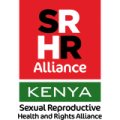OUR WORK
CAPACITY BUILDING
The SRHR Alliance works towards improved SRHR conditions for young people and adults, by strengthening the capacity of the partner organizations in Kenya. The Alliance supports Civil Society organizations to enable these organizations to sustainably promote and implement effective interventions, and to advocate for SRHR in their counties. Capacity building involves activities such as value clarification and joint learning sessions with all implementing partners and the establishment and implementation of clear methodology for collecting data on quantity and quality of services provided.
The SRHR Alliance supports these organizations through funds, technical assistance and capacity building in SRHR, organizing joined sharing and learning, and linking organizations, networks and institutions to increasingly collaborate. Capacity building can come in different forms; by Dutch member organizations, internally between partner organizations, and through external consultants.
Examples of capacity building are Technical Assistance Tracks, for example concerning Alliance building, the development of SRHR curricula, SRHR movement building, discussing Sexual Rights including Sexual diversity, and monitoring systems. These tracks have in common that these are not one off training activities, but longer processes including several training opportunities, sharing and disseminating events and linking and learning.
All partners in the AmplifyChange programme went through an organizational capacity assessment. Based on these assessments, organizations have made organizational capacity plans, defining the areas of need for capacity building. Many partners have since brought the individual organizations objectives up to the level of the country alliance, demonstrating the synergic effect of working in an alliance for capacity strengthening.
RESEARCH
The SRHR Alliance is instrumental in conducting evidence based programmes which are informed by evidence gathering. The Alliance and its partners identify priority areas; the specific needs for SRHR; barriers faced in regard to services. This is done by gathering information from young people from the target groups, youth organizations, service providers, community organizations, including schools.
Systematic data gathering and analysis are continuous processes within the monitoring of the programmes under the SRHR Alliance. Analysis on reflection both on factors that contribute positively to the achievement of objectives as well as on the factors that hamper these achievements are crucial for learning, and as such, for achieving the programs goals.
ADVOCACY
The SRHR Alliance will focus on influencing significant increase on the priority given to SRH in policies, development frameworks, plans and budget allocation in health systems and other relevant sectors at National and County Levels. By advocating, we seek to change (or protect) budgets, policies and legislation to create opportunities for delivering more and better sexual and reproductive health information and services.
The SRHR Alliance also supports organizations in the various partner countries in advocacy matters. After all, realizing a well-functioning health care and supporting the population’s SRHR is one of the duties of the national government. However, there is often a lack of resources and the government may choose other priorities. We help our partner organizations in clearly formulating their needs, such as more contraceptives or better legislation in the area of sex education. Subsequently, they will be able to discuss the matter with their governments and together find structural solutions that will support the target groups of our partner organizations.
NETWORKING

